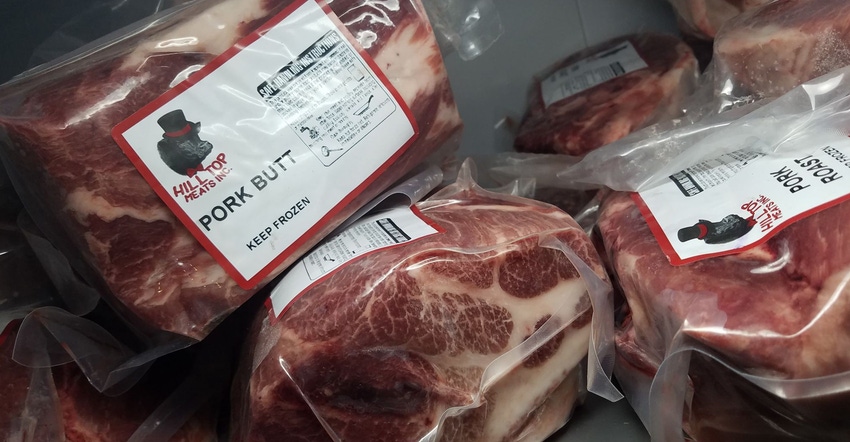
For Heather and Lucas Lang of White Heart Ranch in North Dakota, the decision to start marketing their farm products directly to consumers came from a passion of their industry.
“As we have been advocating for agriculture for a number of years, this past year we really noticed that people were longing to make that connection to the farmer and rancher, and to know where their food was coming from,” Heather Lang says. “When COVID hit and the shelves were going empty, we decided that we produce this great, amazing, locally grown food, why not make it available?”
The Langs raise cattle, pigs and specialty small grains, such as barley, flax and oats. These products and more are available at their farm shop, Sterling Cuts, in Sterling. “We’re offering beef and pork, and then other goods made from products grown on our farm such as bread and jellies,” Lang says.
A unique offering in their farm shop is heritage pork cuts. “Heritage pork are the older breeds. These are set apart from pork in grocery stores in that it’s a darker red and almost looks like a steak,” she says. In addition to this coloring, it is more flavorful and has a thicker layer of fat on certain cuts. “It’s something that chefs actually seek out due to that distinct flavoring.”
While some families buy meat by the whole, half or quarter, Lang says they want to ensure high-quality meat is available in smaller portions. “We’re still offering that whole or half beef or pork, but for those families who maybe can’t afford that option or have the freezer space for all that meat, we want it to be available to them, too,” she explains.
Their farm shop also features an assortment of chicken and duck eggs, and other products from North Dakota producers that are available seasonally, such as baked goods, various jellies, goat milk lotions and soaps, and other Pride of Dakota products.
“We’ll be always adding more things, but we’re a little bit more specialty focused, carrying things you can’t find everywhere else,” Lang says.
Advocating for the industry
Lang stays active on social media, and advocates for agriculture by presenting at schools and public events, and with their customers. “I try to do a lot on our social media pages and on our website. You know we talk about the differences of grain finished and how there is never any antibiotics in meat, whether that be in the grocery store or someone selling USDA meats,” she explains.
Lang grew up in a suburb, and she uses that connection to dispel myths and concerns about their family farm with consumers. “You know there are just a lot of labels out there, and it gets confusing and overwhelming. Anytime we get to go talk about our pigs and our farm, and have some great conversations about agriculture, we’re all gaining, so we love it,” Lang says.
“By building those relationships, I’ve been able to build up my connections through the years through social media, or events I speak at, or through my teaching at schools. The more you can get people to think of you when they think of a farmer is a huge plus, as they can then ask you those questions about their food,” she says.
Creating a business
To add a direct marketing business onto their operation, Lang says the first step was a visit with the North Dakota Department of Agriculture. “It was a pretty simple process. We had to fill out some paperwork and nothing was too daunting,” she says.
The Langs have started small in their farm shop, converting an existing 12-by-16-foot shed into their shop.
“If it takes off in the next few years, we definitely want to expand and add to the shop,” she says. “For anyone who wants to diversify and make that extra bit of income off things they’re already doing on their farm, I say absolutely do it. People are wanting that connection to agriculture, and they want to know where food is coming from, so I say why not give it a shot?”
To browse Sterling Cut’s offerings online, check out their farm's website.
About the Author(s)
You May Also Like






